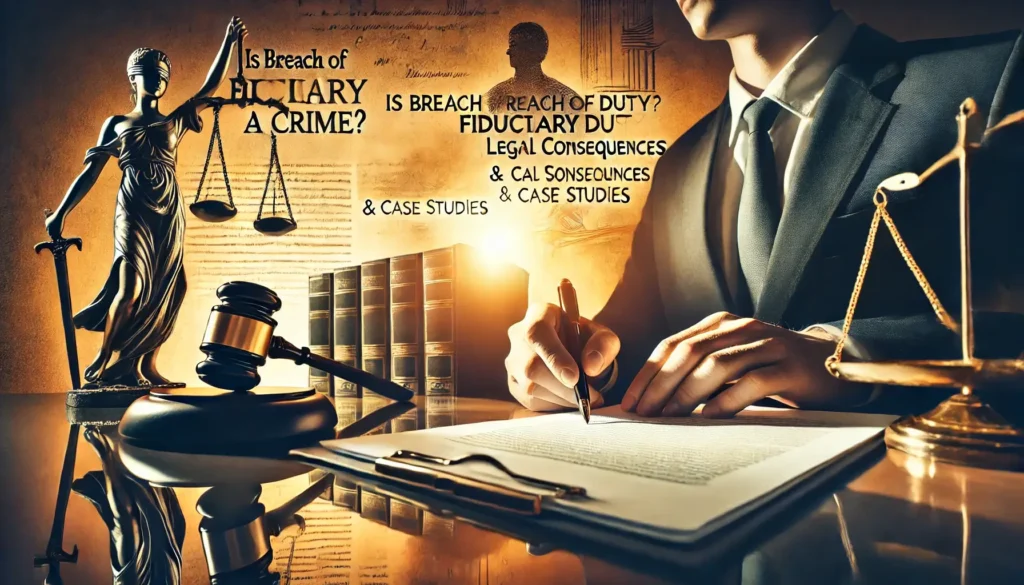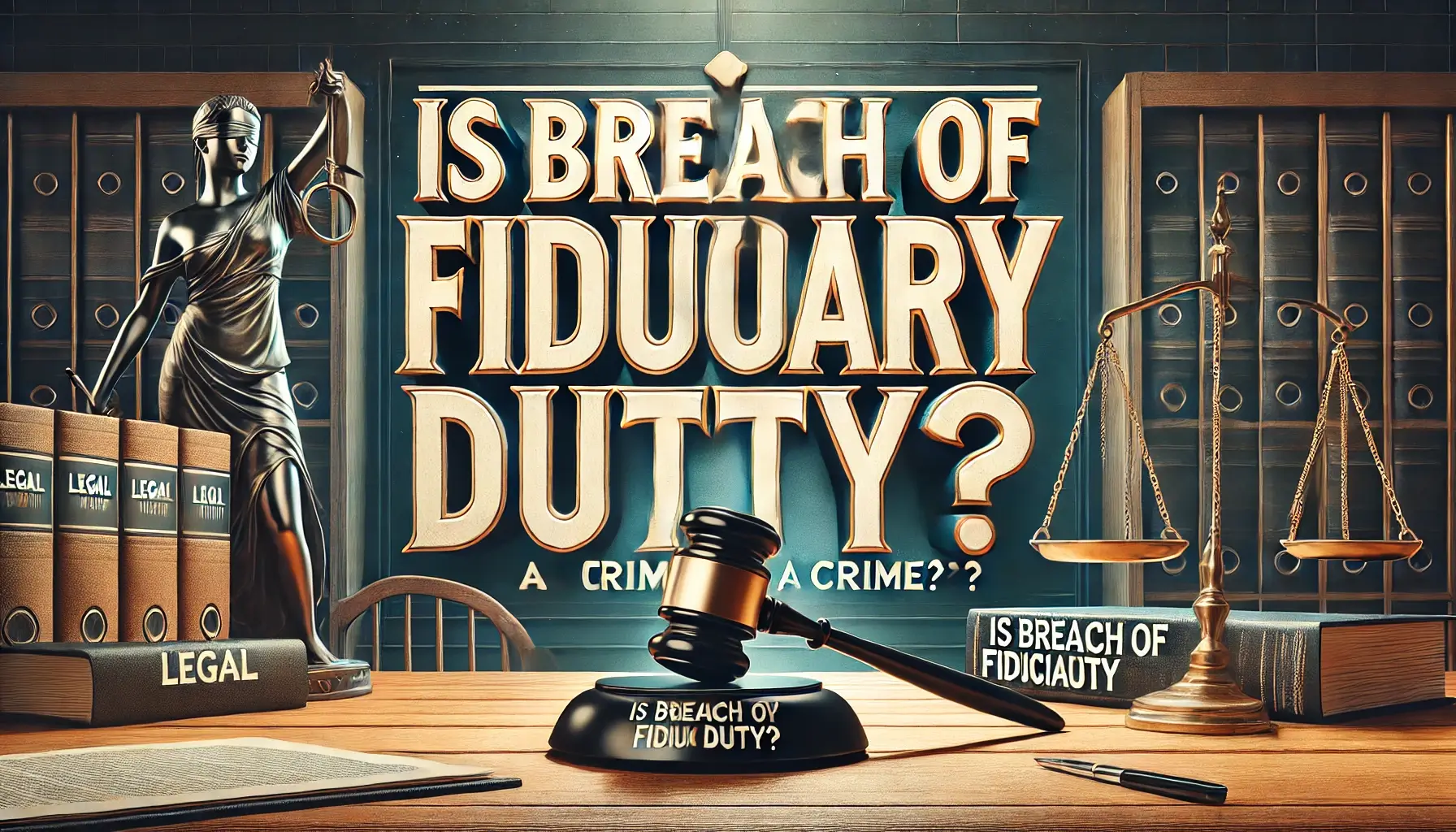Is Breach of Fiduciary Duty a Crime? Legal Consequences & Case Studies
Introduction
Fiduciary duty is a legal obligation that binds an individual or entity to act in the best interests of another party. This duty typically arises in relationships involving trust, such as between attorneys and clients, corporate officers and shareholders, trustees and beneficiaries, and financial advisors and their clients. When a fiduciary fails to uphold this duty, it can lead to serious legal consequences. However, whether a breach of fiduciary duty constitutes a crime depends on several factors, including intent, the nature of the breach, and the governing laws.
This article explores the legal framework surrounding fiduciary duty, the distinction between civil and criminal liability, notable case examples, and the potential consequences of breaching fiduciary obligations.
Understanding Fiduciary Duty
Fiduciary duty imposes an ethical and legal obligation on one party (the fiduciary) to act in the best interests of another party (the principal or beneficiary). Fiduciaries must exercise loyalty, care, and full disclosure when managing another party’s affairs. Some key fiduciary relationships include:
- Corporate Officers and Shareholders: Corporate executives must act in the best interests of their company and shareholders.
- Attorneys and Clients: Lawyers are bound by ethical and legal rules to represent their clients faithfully and competently.
- Trustees and Beneficiaries: Trustees must manage trust assets with diligence and integrity.
- Financial Advisors and Clients: Financial professionals have a duty to provide honest and competent financial advice.
Civil vs. Criminal Liability in Fiduciary Breach Cases
A breach of fiduciary duty is primarily considered a civil offense rather than a criminal one. However, in some cases, the breach may involve fraudulent activities, embezzlement, or other criminal conduct, leading to criminal charges.
Civil Liability
In most cases, breaches of fiduciary duty result in civil lawsuits. Plaintiffs must prove:
- A fiduciary relationship existed.
- The fiduciary breached their duty.
- The breach caused harm or financial loss.
- The plaintiff suffered damages as a result.
Potential civil remedies include compensatory damages, restitution, or equitable relief such as injunctions.
Criminal Liability
A breach of fiduciary duty can escalate to criminal charges if the fiduciary engages in fraudulent, deceptive, or dishonest practices. Criminal charges may apply if:
- The breach involves fraud (e.g., misrepresentation, deceit, or intentional financial misconduct).
- The fiduciary engages in embezzlement or misappropriation of funds.
- The breach involves insider trading, bribery, or public corruption.
Penalties for criminal breaches may include fines, imprisonment, and professional disqualification.

Examples of Criminal Breach of Fiduciary Duty Cases
Several high-profile cases illustrate when breaches of fiduciary duty lead to criminal charges:
- Enron Scandal (2001): Executives at Enron Corporation engaged in fraudulent accounting practices, misleading shareholders and employees. Several executives faced criminal charges, including fraud and conspiracy.
- Bernie Madoff Ponzi Scheme (2008): Madoff, a financial advisor, defrauded investors of billions through a Ponzi scheme. He was convicted of securities fraud and sentenced to 150 years in prison.
- Wells Fargo Unauthorized Accounts Scandal (2016): Employees at Wells Fargo created unauthorized accounts to meet sales targets, breaching fiduciary duty and facing both civil penalties and criminal investigations.
Legal Framework and Jurisdictional Differences
The classification of fiduciary duty breaches varies by jurisdiction. Some countries and states have stricter regulations governing fiduciary responsibilities:
- United States: Federal laws like the Sarbanes-Oxley Act and Dodd-Frank Act impose criminal penalties for certain fiduciary breaches in corporate governance.
- United Kingdom: The Companies Act 2006 outlines fiduciary duties for directors, and breaches can result in criminal liability if fraud or dishonesty is involved.
- European Union: Regulations like GDPR impose fiduciary-like obligations on data controllers and processors, with severe penalties for violations.
Consequences of Breaching Fiduciary Duty
The repercussions of breaching fiduciary duty depend on the severity and nature of the breach. Potential consequences include:
Civil Consequences
- Financial restitution to victims.
- Disgorgement of unlawfully gained profits.
- Removal from fiduciary positions.
- Reputational damage and loss of professional licenses.
Criminal Consequences
- Fines and financial penalties.
- Imprisonment for serious offenses like fraud and embezzlement.
- Permanent ban from holding fiduciary roles in financial and corporate sectors.
How to Avoid Breaching Fiduciary Duty
Fiduciaries can take several measures to prevent breaches and ensure compliance with legal and ethical obligations:
- Maintain transparency: Provide full disclosure of relevant information to beneficiaries.
- Act in good faith: Make decisions that prioritize the principal’s best interests.
- Document transactions: Keep thorough records to demonstrate compliance.
- Seek legal guidance: Consult attorneys or compliance experts when in doubt.

Conclusion
A breach of fiduciary duty is not inherently a crime, but it can lead to criminal liability when it involves fraud, theft, or other illegal activities. While most breaches result in civil litigation, certain cases—such as corporate fraud, embezzlement, and insider trading—can result in criminal prosecution. Fiduciaries must uphold their obligations with integrity to avoid legal consequences and protect the interests of those they serve. Understanding the distinctions between civil and criminal liability is crucial for businesses, professionals, and legal practitioners navigating fiduciary responsibilities.







